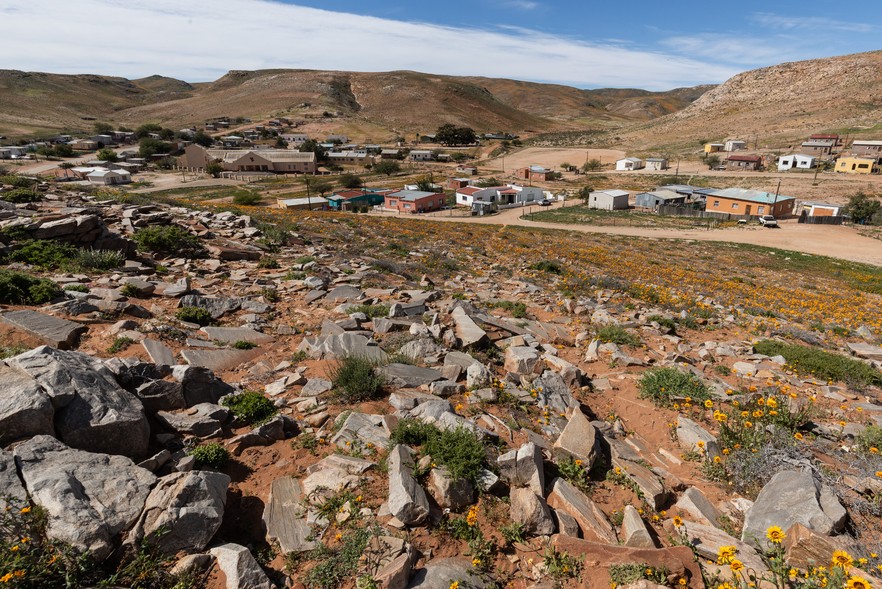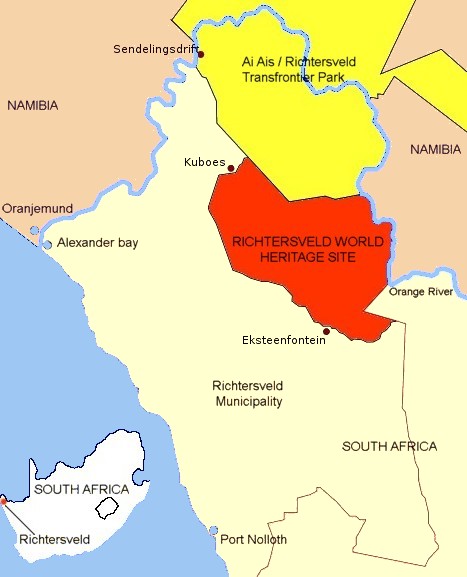
7 March 2024
The Richtersveld towns, such as Lekkersing, are remote – about 40km from Eksteenfontein, 70km from Kuboes, and 80km from Sanddrif.
Lees hierdie artikel in Afrikaans (PDF)
The Richtersveld community is divided over the government’s plans for a massive “green hydrogen” project in Boegoebaai Port, Northern Cape.
The remote communities of the Richtersveld have had bad experiences in the past. They endured a lengthy land claim battle against state-owned diamond company Alexkor, ultimately winning a landmark case in the Constitutional Court in 2003.

Map of the Richtersveld by Wikipedia user Waitabout. (CC BY-SA 3.0)
A settlement reached in 2007 established the Pooling and Sharing Joint Venture (PSJV), with Alexkor holding a 51% interest and the community 49% through the Richtersveld Mining Company (RMC).
The agreement included restoring mining rights to the community, financial compensation for the losses they sustained from diamond mining since the early 1900s, and environmental rehabilitation.
But the community has gained little from the initial settlement, due to the internal conflict it fuelled, a dysfunctional Communal Property Association, as well as maladministration and state capture.
Now a section of the community fears a repeat of the diamond mining experience with government’s development of the Boegoebaai Port and its green hydrogen mega-project in a vastly expanded Namakwa Special Economic Zone. The project has the backing of President Cyril Ramaphosa.
State-owned Alexkor holds 51% in the Pooling and Sharing Joint Venture (PSJV) and the Richtersveld Mining Company, representing the community, holds 49%
In December, about 200 members of the Richtersveld community wrote to the Northern Cape Economic Development Trade and Investment Promotion Agency (NCEDA) and the Communal Property Association (CPA) committee seeking clarity on an access agreement for the Special Economic Zone, largely on land owned by the community.
The letter expressed concerns over the legality and legitimacy of decisions by the CPA committee and the NCEDA which impact the community’s property rights. They allege non-compliance with the CPA Act, specifically the lack of go-ahead from the majority of members of the CPA.
Willem Cloete, a CPA member, was born and raised in the Richtersveld town of Lekkersing. He said after the Constitutional Court victory in 2003, “Everyone looked forward to and believed that [their] circumstances would now change.”
But the community became divided following the 2007 settlement, he said.
He sees the green hydrogen project presenting a “similar situation”.
“It is being done without consultation with communities and without permission,” he said.
“They must provide us with an independent environment assessor here if they want to build the harbour, so the community can understand what will be the advantages and disadvantages and make informed decisions,” he said.
Meanwhile, the Special Investigating Unit (SIU) announced on 12 February that it is investigating allegations of corruption and maladministration at the NCEDA.
The NCEDA did not respond to our request for comment.
Willem Cloete was born and raised in Lekkersing. He said when the Constitutional Court ruled in favour of the community in 2003, people had hoped they would finally benefit from diamond mining on their land.
In February 2020, the CPA was placed under administration of the Department of Agriculture, Land Reform and Rural Development (DALRRD) by the Northern Cape High Court for three years.
During this time, the department told Parliament that the bloated structure of the Richtersveld entities was primarily to blame for conflict in the community.
The deed of settlement in 2007 required that at least two trusts and six companies had to be established to manage the CPA’s dealings: the Richtersveld Community Trust, Richtersveld Investment Trust, Richtersveld Self Development Company, Richtersveld Investment Holdings, Richtersveld Property Holding, Richtersveld Agricultural Holding, the Richtersveld Environmental Rehabilitation, and the Richtersveld Mining Company (RMC).
When administration ended in February 2023, the CPA was reconstituted following an election. However, the legitimacy of these elections was disputed.
On 29 November 2023, during a briefing to the National Council of Provinces, Alexkor admitted that “due to the dysfunctionality of the CPA and Richtersveld Mining Company until this year, the CPA had not really materially benefited in direct ways from having their land restored to them since acquiring the land and the mining rights”.
Spokesperson for the Department of Public Enterprises Ellis Mnyandu told GroundUp that over the years the Pooling and Sharing Joint Venture (PSJV) had recorded significant losses and had been unable to declare any dividends for its shareholders.
“The PSJV Board is working on a turnaround plan to improve operations and ensure that the community benefits from the mining assets,” said Mnyandu.
Alexkor said the joint venture had contributed to socio-economic and social upliftment and “attempts are being made to address the community’s concerns”.
The Richtersveld population is about 15,000 people, according to the Namakwa District Municipality Integrated Development Plan (IDP) 2022 - 2027. The latest Census puts the figure at 25,000.
A special general meeting of CPA members was held on 16 December 2023. Five resolutions were adopted.
One was to object to the NCEDA access agreement, demanding the community be fully informed of its details and a legitimate process be followed.
Other resolutions included the removal of government representatives from the CPA committee, moving the CPA offices from Alexander Bay to Sanddrif, and an application to the Land Claims Court to amend the 2007 settlement in order to establish a functioning joint venture (the PSJV) able to pay royalties to the Richtersveld trusts.
The community members also objected to the three representatives of the community appointed to the PSJV by the Northern Cape High Court in June 2023.
CPA chairperson Nicodemis Swartbooi did not attend the meeting and is disputing the legitimacy of the resolutions taken.
Swartbooi has accused the CPA members of trying to create a “parallel structure”, creating division in the community, and trying to “undermine” the CPA committee’s role and influence in the community.
He said their actions were tantamount to treason against their own people and community.
Cloete, in response, said the meeting was done in line with the CPA constitution.
“Our only motivation is democratic principles and provisions of the CPA Act,” he said.
Swartbooi said they would respond after consulting their lawyers, but had not yet done so at the time of publication.
Cloete said Department of Agriculture, Land Reform and Rural Development representatives have agreed to meet with the community on 12 March.
The Richtersveld is a World Heritage Site.